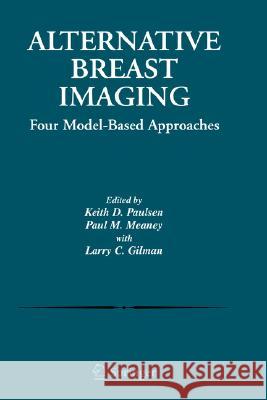Alternative Breast Imaging: Four Model-Based Approaches » książka
Alternative Breast Imaging: Four Model-Based Approaches
ISBN-13: 9780387233635 / Angielski / Twarda / 2004 / 254 str.
Medical imaging has been transformed over the past 30 years by the advent of computerized tomography (CT), magnetic resonance imaging (MRI), and various advances in x-ray and ultrasonic techniques. An enabling force behind this progress has been the (so far) exponentially increasing power of computers, which has made it practical to explore fundamentally new approaches. In particular, what our group terms "model-based" modalities-which produce tissue property images from data using nonlinear, iterative numerical modeling techniques-have become increasingly feasible. Alternative Breast Imaging: Four Model-Based Approaches explores our research on four such modalities, particularly with regard to imaging of the breast: (1) MR elastography (MRE), (2) electrical impedance spectroscopy (EIS), (3) microwave imaging spectroscopy (MIS), and (4) near infrared spectroscopic imaging (NIS). Chapter 1 introduces the present state of breast imaging and discusses how our alternative modalities can contribute to the field. Chapter 2 looks at the computational common ground shared by all four modalities. Chapters 2 through 10 are devoted to the four modalities, with each modality being discussed first in a theory chapter and then in an implementation-and-results chapter. The eleventh and final chapter discusses statistical methods for image analysis in the context of these four alternative imaging modalities. Imaging for the detection of breast cancer is a particularly interesting and relevant application of the four imaging modalities discussed in this book. Breast cancer is an extremely common health problem for women; the National Cancer Institute estimates that one in eight US women will develop breast cancer at least once in her lifetime. Yet the efficacy of the standard (and notoriously uncomfortable) early-detection test, the x-ray mammogram, has been disputed of late, especially for younger women. Conditions are thus ripe for the development of affordable techniques that replace or complement mammography. The breast is both anatomically accessible and small enough that the computing power required to model it, is affordable.











